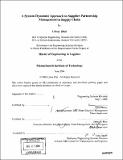A system dynamics approach to supplier partnership management in supply chain
Author(s)
Zhai, Lihua, 1977-
DownloadFull printable version (4.493Mb)
Other Contributors
Massachusetts Institute of Technology. Engineering Systems Division.
Advisor
James Hines and James B. Rice.
Terms of use
Metadata
Show full item recordAbstract
To be competitive and quick-to-market in today's global marketplace, Electronic Manufacturing Service (EMS) providers should focus on their core competencies, partnership relationships and continuous improvements. As Original Equipment Manufacturers (OEMs) Customers shift their focus on marketing and product development, EMS providers have been assuming the leading role to develop creative manufacturing solutions based on the core competencies in their supply chains. A tightly-coupled and synergistic relationship with OEM customers and key components suppliers is critical to EMS providers' success. This thesis focuses on applying system dynamics approach to supplier partnership management at FSJC, a top player in EMS industry, with the aim of gain deeper understanding on dynamics within FSJC's supply chain network and between suppliers and FSJC. We find out that to maintain its market position, FSJC must concentrate on small number of qualified suppliers and put effort to build strong partnership with these suppliers. This requires a better understanding of the impact of key parameters of partnership and manufacturing process of both suppliers and FSJC. Developing this sort of understanding can help FSJC continue to provide worldwide responsiveness to its customers by improving time-to-market, scalability and manufacturing efficiency and foster long-term partnership with both customers and suppliers by improving communications both upstream and downstream in the supply chain.
Description
Thesis (M. Eng. in Logistics)--Massachusetts Institute of Technology, Engineering Systems Division, 2004. Includes bibliographical references (leaf 62 ).
Date issued
2004Department
Massachusetts Institute of Technology. Engineering Systems DivisionPublisher
Massachusetts Institute of Technology
Keywords
Engineering Systems Division.